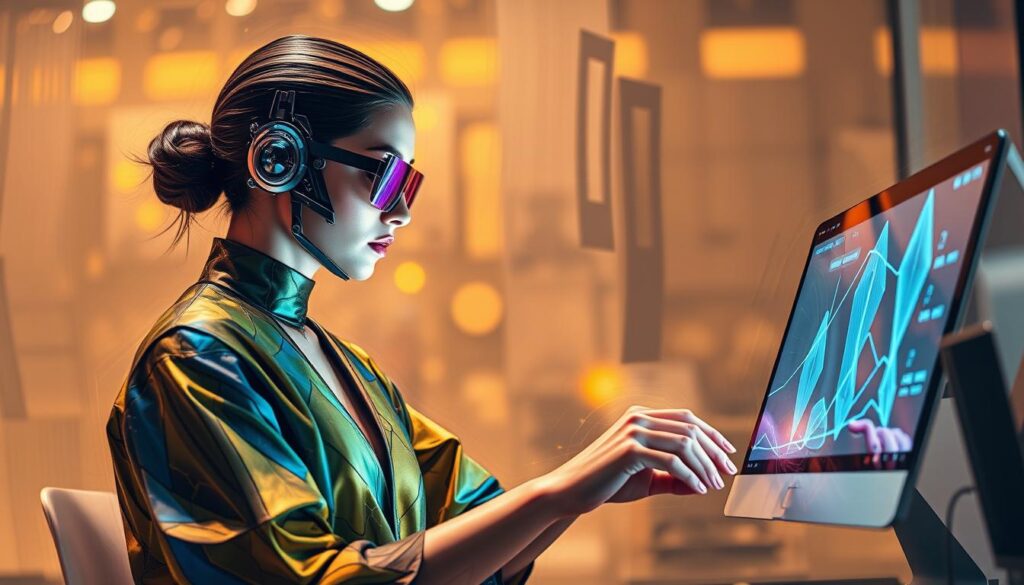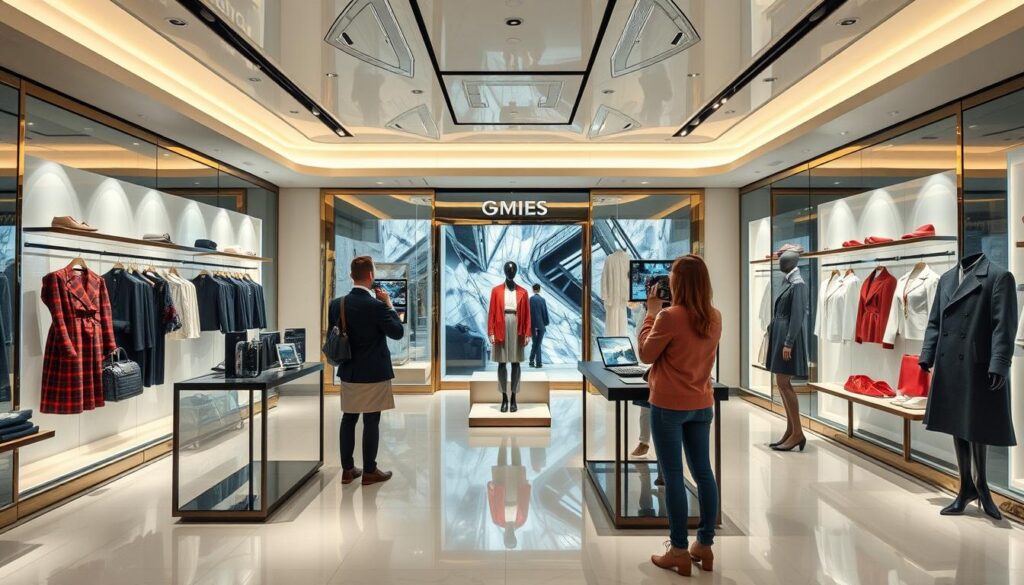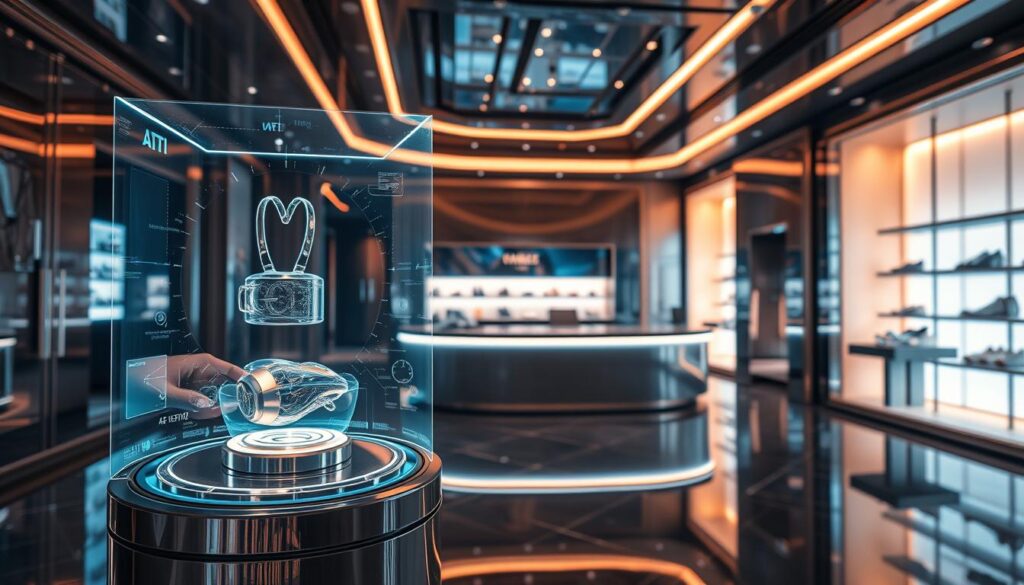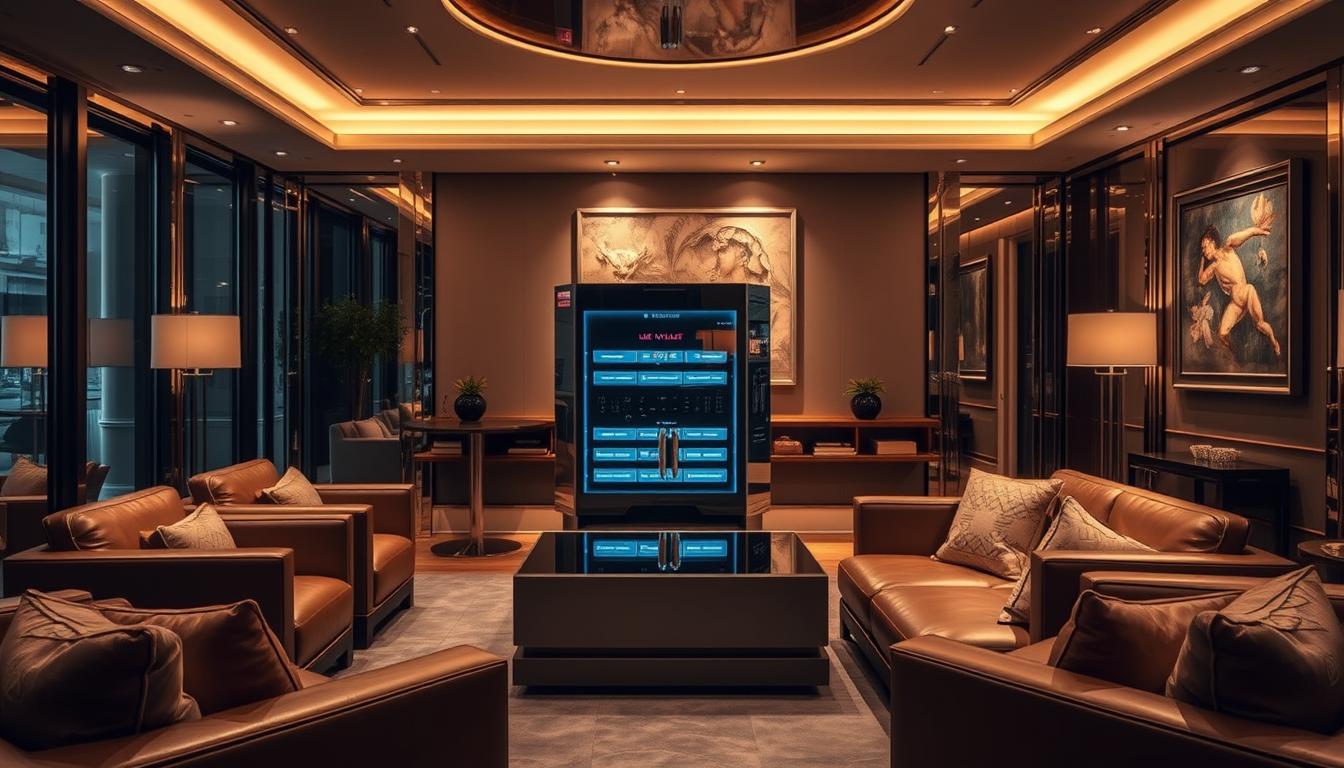The luxury industry is undergoing a significant transformation as technology reshapes how premium brands create, market, and sell their products to discerning consumers.
We’re witnessing a remarkable fusion of traditional craftsmanship with innovative tech, creating unprecedented opportunities for luxury brands to connect with customers in more meaningful and personalized ways.
At CoWrit Technologies, we’ve analyzed the most significant technological trends elevating luxury experiences. Our experts in digital transformation recognize the competitive advantage that comes with technological innovation in the luxury sector.
Key Takeaways
- The luxury tech market is projected to grow from $1.2 billion in 2024 to $5.6 billion by 2034.
- AI-powered personalization is enhancing customer experiences in the luxury industry.
- Blockchain authentication is being used to verify the exclusivity and craftsmanship of luxury products.
- Luxury brands are leveraging technology to optimize supply chains and innovate marketing strategies.
- The integration of technology is transforming entire business models and customer relationships in the luxury sector.
The Evolution of Luxury in the Digital Age
As we navigate the ever-changing landscape of luxury, it’s clear that technology is redefining the industry. The luxury sector, long characterized by its emphasis on craftsmanship and exclusivity, is now embracing digital innovation to enhance customer experiences.
Historically, luxury brands built their reputations on exceptional materials, meticulous handcrafting, and exclusive distribution channels. However, the modern luxury landscape has transformed dramatically. Today, brands recognize that digital technology can enhance rather than diminish the exclusivity and special experiences that luxury consumers expect.
From Traditional Craftsmanship to Tech-Enhanced Experiences
The evolution in the luxury sector is marked by a shift from purely artisanal craftsmanship to a sophisticated blend of traditional techniques and cutting-edge technology. This blend enables brands to offer more personalized and engaging experiences to their customers.
We’ve observed that modern luxury brands are embracing technology not just as a marketing tool but as an integral part of their product development, customer service, and overall brand experience. This integration is driven by changing consumer expectations, particularly among younger affluent consumers who value both craftsmanship and technological innovation.
Why Modern Luxury Brands Are Embracing Technology
Brands in the luxury market are using technology to reinforce their exclusivity while becoming more accessible to their target audiences through digital channels. According to recent trends, the most successful luxury brands maintain a delicate balance between preserving their heritage and embracing innovation.
For more insights on how luxury is being redefined in the digital age, visit Forbes to explore the latest trends and analysis.
Cutting-Edge Technology in Luxury Products: Transforming the Industry
Luxury brands are embracing innovative technologies to redefine their products and services. We’re witnessing a significant shift in how luxury goods are designed, manufactured, and authenticated, thanks to the integration of advanced technologies.

AI and Machine Learning: The New Artisans
Artificial intelligence (AI) and machine learning are revolutionizing product development in the luxury sector. Algorithms analyze vast amounts of design data to suggest innovative concepts while preserving brand aesthetics. AI is becoming the new artisan’s assistant, helping designers create more efficiently while maintaining the creative vision and craftsmanship that luxury brands are known for.
We’re seeing AI-driven prototyping enable the creation of new prototypes in hours rather than weeks. This not only reduces the time to market but also preserves the brand’s signature aesthetic. The combination of data analytics and AI is helping luxury brands predict trends and customer preferences with unprecedented accuracy, allowing for more targeted product development.
Blockchain and NFTs: Ensuring Authenticity and Exclusivity
Luxury brands are increasingly turning to blockchain technology to combat counterfeiting and ensure product authenticity. By creating digital “passports” that track items from production to sale, brands can guarantee the genuineness of their products. NFTs (Non-Fungible Tokens) are opening new frontiers for luxury brands, allowing them to create digital collectibles and experiences that complement physical products and reinforce exclusivity.
3D Printing: Revolutionizing Luxury Manufacturing
3D printing technology is transforming luxury manufacturing by enabling the creation of intricate designs that would be impossible to produce using traditional methods. It allows for rapid prototyping, customization, and production of complex designs, thereby revolutionizing the manufacturing processes in the luxury sector.
These technological advancements are not replacing the human element in luxury creation but rather enhancing it, allowing artisans to focus on the most creative and complex aspects of their craft. Brands that successfully integrate these technologies are gaining competitive advantages through faster production cycles, more innovative designs, and enhanced product authentication systems.
Immersive Shopping Experiences: The Future of Luxury Retail
The future of luxury retail is being shaped by immersive shopping experiences that blend physical and digital elements. As technology continues to evolve, luxury brands are presented with new opportunities to engage their customers in innovative ways.

Augmented Reality and Virtual Try-Ons
Augmented reality (AR) is transforming the way customers interact with luxury products online. With virtual try-ons, customers can see how products look on them without having to physically visit a store. Louis Vuitton and Burberry have already integrated AR into their apps, enhancing the digital shopping experience.
Leading luxury brands are developing sophisticated AR applications that allow customers to visualize products in their homes or on their bodies, significantly enhancing the online shopping experience.
Virtual Showrooms and Digital Flagships
Virtual showrooms and digital flagships are extending the reach of luxury brands, allowing them to create stunning retail environments that can be accessed from anywhere in the world. These digital spaces capture the essence and aesthetic of the brand while offering interactive elements that physical stores cannot.
By creating immersive digital environments, luxury brands can engage their customers more effectively and provide a seamless shopping experience across online and offline channels.
Pop-Up Innovations: Blending Physical and Digital Worlds
Pop-up innovations are becoming increasingly popular as luxury brands create temporary physical spaces enhanced by digital technology. Earlier in the year, Louis Vuitton launched over 50 pop-up stores around the world, offering unique experiences that pushed the boundaries of traditional retail.
These pop-up stores not only provide customers with memorable experiences but also encourage brand engagement and loyalty.
Personalization Through Data: The Ultimate Luxury
As we move forward, it’s clear that personalization through data is redefining the luxury experience. Luxury shoppers today expect exclusivity and top-tier craftsmanship, but they also demand hyper-personalized interactions. By leveraging AI algorithms, premium brands can examine browsing histories, purchase patterns, social media activities, and in-store interactions to anticipate customer needs with unprecedented accuracy.

AI-Powered Customer Insights and Recommendations
AI-powered analytics are enabling luxury brands to understand customer preferences at an unprecedented level of detail. From style preferences to shopping habits and even emotional responses to products, these insights allow brands to make highly relevant product recommendations that feel like they’ve been curated by a personal shopper who knows the customer intimately. By analyzing data from multiple sources, luxury brands can develop detailed customer profiles and tailor the shopping experience to their customers’ needs.
Hyper-Personalized Products and Services
The most sophisticated luxury brands are using data to create hyper-personalized products and services, from custom-designed items to bespoke shopping experiences that reflect individual preferences. Personalization extends beyond products to encompass every touchpoint in the customer journey, from customized marketing communications to tailored in-store experiences. This level of personalization not only enhances customer satisfaction but also fosters loyalty and drives business growth.
Balancing Privacy Concerns with Personalization Benefits
As data collection becomes more sophisticated, luxury brands must carefully balance personalization benefits with privacy concerns. Being transparent about how customer information is used is crucial. The most successful luxury brands treat customer data as precious as their most valuable materials, handling it with care and using it to create value for the customer rather than just the brand. By doing so, they build trust and create a more meaningful connection with their customers.
Sustainable Luxury: Technology Driving Ethical Innovation

The intersection of luxury and sustainability is being redefined by cutting-edge technology. As consumers increasingly demand eco-friendly and ethical luxury products, brands are turning to innovative technologies to meet these expectations.
Eco-Friendly Materials and Production Processes
Advanced technologies are helping luxury brands develop innovative eco-friendly materials that maintain the quality and aesthetics expected of premium products while reducing environmental impact. From lab-grown diamonds to bio-fabricated leathers, technology is creating sustainable alternatives to traditional luxury materials without compromising on quality or appearance.
We’re seeing technology become a powerful driver of sustainable practices in the luxury industry, enabling brands to create products that are both exquisite and environmentally responsible.
Transparency and Traceability in Supply Chains
AI and blockchain tools are revolutionizing supply chain management in luxury, creating unprecedented transparency that allows brands to verify the ethical sourcing of materials and fair labor practices. This traceability is increasingly important to luxury consumers who want assurance that their purchases align with their values and don’t come at the cost of environmental or social harm.
By leveraging these technologies, luxury brands can guarantee authenticity and sustainability throughout the supply chain, thereby enhancing their appeal to the growing demographic of eco-conscious consumers.
Conclusion: Embracing the Future of Luxury
As technology advances, luxury brands are presented with unprecedented opportunities to reimagine their business strategies and customer experiences. We’ve explored how cutting-edge technology is transforming the luxury landscape, from AI-enhanced product development to immersive retail experiences and data-driven personalization.
The future of luxury lies in the thoughtful integration of tech that enhances rather than replaces the craftsmanship, exclusivity, and personal service that define premium brands. Successful luxury businesses will be those that leverage technology as a tool to create more meaningful connections with customers while staying true to their heritage and values.
As consumer preferences continue to evolve, luxury brands must remain agile, adopting new technologies and strategies that respond to changing market trends while maintaining their distinctive identity. Data analytics and social media will play increasingly important roles in luxury marketing and management, providing insights that help brands understand their customers at a deeper level.
At CoWrit Technologies Inc, we specialize in helping luxury brands navigate this technological transformation through our expertise in AI applications, content creation, website development, and digital marketing. To learn more about how we can help elevate your luxury brand through cutting-edge technology, contact us via WhatsApp at +44-7822010953 or explore our comprehensive service offerings.


